 I had a pretty gluttonous Thanksgiving. No, I don’t mean green bean casserole and pecan pie (I loathe pumpkin) and cranberry sauce and corn bread stuffing. I certainly don’t mean turkey. As Tom Hanks, thoughtfully portraying children’s TV icon Fred Rogers, observes in the surreally superlative A Beautiful Day in the Neighborhood, “I just can’t imagine eating anything that has a mother.“ Me neither.
I had a pretty gluttonous Thanksgiving. No, I don’t mean green bean casserole and pecan pie (I loathe pumpkin) and cranberry sauce and corn bread stuffing. I certainly don’t mean turkey. As Tom Hanks, thoughtfully portraying children’s TV icon Fred Rogers, observes in the surreally superlative A Beautiful Day in the Neighborhood, “I just can’t imagine eating anything that has a mother.“ Me neither.
No, my holiday indulgences were of the entertainment variety, cramming in as many movies and binge watching as much television as my ever widening derrière could withstand. And, because I am fundamentally sort of lazy and because I realize now that (at times) writing this blog feels more like a penance than a reward for engaging in one of my favorite pastimes (that is, devouring pop culture), this entry is going to be more of a highlight reel of the past several days in entertainment.
 It really is kind of a shame (and the luck of the draw) that I devoted 12 (!) paragraphs to Frozen 2 last week, and something as boffo and transcendent as the West End production of musical Kinky Boots (broadcast on PBS’ Great Performances) or Damon Lindelof’s continuation (via HBO) of Alan Moore’s/Dave Gibbons’ seminal comic book masterpiece Watchmen will only get a sentence or two. I can watch this stuff or I can write about this stuff, but it’s getting too damn hard to try to do both and still enjoy it.
It really is kind of a shame (and the luck of the draw) that I devoted 12 (!) paragraphs to Frozen 2 last week, and something as boffo and transcendent as the West End production of musical Kinky Boots (broadcast on PBS’ Great Performances) or Damon Lindelof’s continuation (via HBO) of Alan Moore’s/Dave Gibbons’ seminal comic book masterpiece Watchmen will only get a sentence or two. I can watch this stuff or I can write about this stuff, but it’s getting too damn hard to try to do both and still enjoy it.
Be that (self-pitying moment) as it may, so much of the entertainment I will discuss below shares a common point of view. Whether ethereal drag queens or plucky Pakistani teens who idolize Bruce Springsteen, war-weary space age bounty hunters or cynical costumed vigilantes, precocious Nazi youths who come to realize Adolf Hitler is a less-than-ideal playmate or twinkly-eyed but secretly heavy-hearted kiddie show hosts, the characters who jumped off the screen in these movies and shows share a feverishly urgent demand for kindness, tolerance, justice, inclusion, and love. Timely for this holiday season … and timely for a culture in crisis. As Lola (played by that luminous and shamanistic firecracker Matt Henry) sings in Kinky Boots: “We give good epiphany.”
 A Beautiful Day in the Neighborhood is exceptional, in great part because the cast – the aforementioned Hanks, Matthew Rhys as a hardened journalist determined to find the toxic truth underlying Mr. Rogers’ sunny sanctimony, and Chris Cooper as Rhys’ neglectful/neglected papa – sidestep any mawkishness inherent in the material with their honest, unadorned portrayals. More to the point, director Marielle Heller takes her cue from the source material – an Esquire cover story – turning in a film that is more clear-eyed essay than slice-of-life biopic. Everything in the movie feels as slightly left of center as any episode of Mr. Rogers’ Neighborhood ever did, acknowledging the program’s twee sensibilities and refracting the show’s heightened sense of “make believe” wonder as a metaphorical context for the tiny cruelties family and friend exact on a daily, perhaps hourly basis. It’s a good movie, not quite a great one, but the comforting cinematic equivalent of a scruffy, slightly embarrassing cardigan and pair of house shoes.
A Beautiful Day in the Neighborhood is exceptional, in great part because the cast – the aforementioned Hanks, Matthew Rhys as a hardened journalist determined to find the toxic truth underlying Mr. Rogers’ sunny sanctimony, and Chris Cooper as Rhys’ neglectful/neglected papa – sidestep any mawkishness inherent in the material with their honest, unadorned portrayals. More to the point, director Marielle Heller takes her cue from the source material – an Esquire cover story – turning in a film that is more clear-eyed essay than slice-of-life biopic. Everything in the movie feels as slightly left of center as any episode of Mr. Rogers’ Neighborhood ever did, acknowledging the program’s twee sensibilities and refracting the show’s heightened sense of “make believe” wonder as a metaphorical context for the tiny cruelties family and friend exact on a daily, perhaps hourly basis. It’s a good movie, not quite a great one, but the comforting cinematic equivalent of a scruffy, slightly embarrassing cardigan and pair of house shoes.
 Jojo Rabbit takes the Merrie Melodies lunacy of actor/director Taika Waititi’s Thor: Ragnarok and applies it to the genocidal moral conflict of being a young, patriotically-obsessed citizen in WWII Nazi Germany. Hmmmm. Take The Mortal Storm, The Tin Drum, To Be Or Not To Be, Moonrise Kingdom, The Pianist, Lord of the Flies, and A Christmas Story, throw them into a blender, and have said output be directed by a less precious, more humane Wes Anderson … after drinking three spiked Red Bulls? The resulting film would be Jojo Rabbit. (Waititi also plays the titular character’s imaginary playmate … Adolf Hitler.) The film depicts a Nazi-aspirant young boy (charismatic Roman Griffin Davis) and his less nationalistic mother (Scarlett Johansson about as charming and vibrant as I’ve ever seen her) surviving the dadaistic absurdity of a country run by race-mongering juvenile delinquents (in other words, an on-the-nose allegory for our presently fraught times). The enterprise works far better than it should, aided and abetted by a witty and whimsical supporting cast including Sam Rockwell and Rebel Wilson. By the time this satirical picaresque meanders to its conclusion, you will be shocked a few times, horrified a few more, laughing and maybe crying uncomfortably, in part due to subject matter and in part due to dodgy artistic execution. Again, a good movie with an essential message, and one that may age into something classic as viewers discover it after its theatrical run.
Jojo Rabbit takes the Merrie Melodies lunacy of actor/director Taika Waititi’s Thor: Ragnarok and applies it to the genocidal moral conflict of being a young, patriotically-obsessed citizen in WWII Nazi Germany. Hmmmm. Take The Mortal Storm, The Tin Drum, To Be Or Not To Be, Moonrise Kingdom, The Pianist, Lord of the Flies, and A Christmas Story, throw them into a blender, and have said output be directed by a less precious, more humane Wes Anderson … after drinking three spiked Red Bulls? The resulting film would be Jojo Rabbit. (Waititi also plays the titular character’s imaginary playmate … Adolf Hitler.) The film depicts a Nazi-aspirant young boy (charismatic Roman Griffin Davis) and his less nationalistic mother (Scarlett Johansson about as charming and vibrant as I’ve ever seen her) surviving the dadaistic absurdity of a country run by race-mongering juvenile delinquents (in other words, an on-the-nose allegory for our presently fraught times). The enterprise works far better than it should, aided and abetted by a witty and whimsical supporting cast including Sam Rockwell and Rebel Wilson. By the time this satirical picaresque meanders to its conclusion, you will be shocked a few times, horrified a few more, laughing and maybe crying uncomfortably, in part due to subject matter and in part due to dodgy artistic execution. Again, a good movie with an essential message, and one that may age into something classic as viewers discover it after its theatrical run.
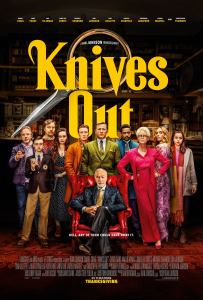 Knives Out is just ok. There are far better versions of this movie and far worse, but I think I’d rather spend an afternoon with Sleuth or Murder by Death, hell, even Deathtrap before giving Knives Out another go. As Daniel Craig, playing a crispy-fried Foghorn Leghorn private detective with none of the zingy Mason-Dixon daffiness he exuded in Logan Lucky, notes regarding the reading of a family will, “Think of a community theatre production of a tax return.” That quote could describe this overeager flick as well. Writer/director Rian Johnson piles on the fake-outs and redirects, putting his breathless cast through its paces, and, while there is fun to be had, there’s just not nearly enough of it. Johnson has assembled a Whitman’s Sampler of movie star character players – Craig, Chris Evans, Jamie Lee Curtis, Michael Shannon, Don Johnson, Toni Collette, and Christopher freaking Plummer – and they all have moments (Chris Evans and Don Johnson acquitting themselves the best here), but I left the film with itchy teeth and liking everyone involved just a little bit less. That said, I applaud Rian Johnson and company for using the populist entertainment value of this black comedy as a Trojan horse for some biting, insightful social commentary about the entitled wealthy and the festering racism in Trump’s America.
Knives Out is just ok. There are far better versions of this movie and far worse, but I think I’d rather spend an afternoon with Sleuth or Murder by Death, hell, even Deathtrap before giving Knives Out another go. As Daniel Craig, playing a crispy-fried Foghorn Leghorn private detective with none of the zingy Mason-Dixon daffiness he exuded in Logan Lucky, notes regarding the reading of a family will, “Think of a community theatre production of a tax return.” That quote could describe this overeager flick as well. Writer/director Rian Johnson piles on the fake-outs and redirects, putting his breathless cast through its paces, and, while there is fun to be had, there’s just not nearly enough of it. Johnson has assembled a Whitman’s Sampler of movie star character players – Craig, Chris Evans, Jamie Lee Curtis, Michael Shannon, Don Johnson, Toni Collette, and Christopher freaking Plummer – and they all have moments (Chris Evans and Don Johnson acquitting themselves the best here), but I left the film with itchy teeth and liking everyone involved just a little bit less. That said, I applaud Rian Johnson and company for using the populist entertainment value of this black comedy as a Trojan horse for some biting, insightful social commentary about the entitled wealthy and the festering racism in Trump’s America.
 Blinded by the Light (on DVD and streaming) is directed with a sure hand by Gurinder Chadha, employing pretty much the exact same template she rode to international success with Bend It Like Beckham (which in and of itself follows the pattern of so many working class British dramedies like Billy Elliot or The Full Monty, depicting resourceful souls rising above class warfare). If it ain’t broke, don’t fix it. Based on a true story, the film focuses on a young Pakistani man (an appealing turn by Viveik Kalra) who strives to overcome the racist nationalism (there’s that theme again!) and economic disparity of 1980s Thatcherite England and to break loose from a well-intentioned but overbearing father who can’t understand his boy’s dreams of becoming a writer. (“Where’s the money in that?!” asks this guy writing a movie blog for free.) Instead of soccer, our protagonist finds his muse in the lyricism of “The Boss” Bruce Springsteen, encouraged by a wry but loving literature teacher (a marvelous Hayley Atwell) and some beautifully drawn teenage pals (Aaron Phagura and Nell Williams). The film is as predictable as all great fables can be but is delicately executed, well-acted, and simultaneously sobering and inspiring. And, yes, this bonbon of a film seems ready-made to be musicalized.
Blinded by the Light (on DVD and streaming) is directed with a sure hand by Gurinder Chadha, employing pretty much the exact same template she rode to international success with Bend It Like Beckham (which in and of itself follows the pattern of so many working class British dramedies like Billy Elliot or The Full Monty, depicting resourceful souls rising above class warfare). If it ain’t broke, don’t fix it. Based on a true story, the film focuses on a young Pakistani man (an appealing turn by Viveik Kalra) who strives to overcome the racist nationalism (there’s that theme again!) and economic disparity of 1980s Thatcherite England and to break loose from a well-intentioned but overbearing father who can’t understand his boy’s dreams of becoming a writer. (“Where’s the money in that?!” asks this guy writing a movie blog for free.) Instead of soccer, our protagonist finds his muse in the lyricism of “The Boss” Bruce Springsteen, encouraged by a wry but loving literature teacher (a marvelous Hayley Atwell) and some beautifully drawn teenage pals (Aaron Phagura and Nell Williams). The film is as predictable as all great fables can be but is delicately executed, well-acted, and simultaneously sobering and inspiring. And, yes, this bonbon of a film seems ready-made to be musicalized.
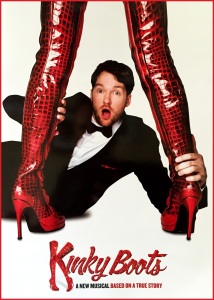 Speaking of which … Kinky Boots, the Tony-winning musical adaptation by Cyndi Lauper and Harvey Fierstein of the 2005 Brit comedy film of the same name (which starred a then-unknown Joel Edgerton and Chiwetel Ejiofor), was just broadcast on PBS’ Great Performances. To say the show was perfection – as perfectly kicky as the thigh-high red boots drag queen Lola (and later the entire cast) dons during the show – would be the textbook definition of understatement. This cast was the Olivier Award-winning West End crew, led by Matt Henry (my mother accurately observed … move over Shirley Bassey and Lena Horne) as the transformative Lola who storms into the life of bedraggled shoe-factory scion Charlie (a winning Killian Donnelly) and turns a small town on its collective head … for the better. The factory is days away from closing, and, by reinventing itself to serve the “niche market” of drag queen footwear, changes its fortunes … and the lives (and attitudes) of all who work there. This is no To Wong Foo magical drag queen fairy tale, however. Lola (also known as Simon) is a fully realized, poignant, exhilarating human being, complex, complicated, flawed, perfect. In Henry’s manicured hands, Lola is the heart of the show, a beautiful yin to Charlie’s shaggy yang. The stage relationship between Donnelly and Henry is deeply affecting, propelled by Lauper’s pulsing, percolating, nicely integrated score. Amy Lennox as Charlie’s co-worker, confidante, and eventual love interest Lauren is dynamite, a musical comedy crackerjack, balancing pathos and hilarity brilliantly, sometimes in a single phrase. Kinky Boots celebrates accepting who we are (and the gifts which embracing that truth can bring) with warmth, kindness, and about the best pacing I’ve seen onstage.
Speaking of which … Kinky Boots, the Tony-winning musical adaptation by Cyndi Lauper and Harvey Fierstein of the 2005 Brit comedy film of the same name (which starred a then-unknown Joel Edgerton and Chiwetel Ejiofor), was just broadcast on PBS’ Great Performances. To say the show was perfection – as perfectly kicky as the thigh-high red boots drag queen Lola (and later the entire cast) dons during the show – would be the textbook definition of understatement. This cast was the Olivier Award-winning West End crew, led by Matt Henry (my mother accurately observed … move over Shirley Bassey and Lena Horne) as the transformative Lola who storms into the life of bedraggled shoe-factory scion Charlie (a winning Killian Donnelly) and turns a small town on its collective head … for the better. The factory is days away from closing, and, by reinventing itself to serve the “niche market” of drag queen footwear, changes its fortunes … and the lives (and attitudes) of all who work there. This is no To Wong Foo magical drag queen fairy tale, however. Lola (also known as Simon) is a fully realized, poignant, exhilarating human being, complex, complicated, flawed, perfect. In Henry’s manicured hands, Lola is the heart of the show, a beautiful yin to Charlie’s shaggy yang. The stage relationship between Donnelly and Henry is deeply affecting, propelled by Lauper’s pulsing, percolating, nicely integrated score. Amy Lennox as Charlie’s co-worker, confidante, and eventual love interest Lauren is dynamite, a musical comedy crackerjack, balancing pathos and hilarity brilliantly, sometimes in a single phrase. Kinky Boots celebrates accepting who we are (and the gifts which embracing that truth can bring) with warmth, kindness, and about the best pacing I’ve seen onstage.
 Lady & the Tramp (currently streaming on Disney+) is on the small screen where I reckon all of these live action remakes of Disney’s animated classics actually belong. Seriously, 20 years ago, these things would have all been very special presentations on Sunday nights on The Wonderful World of Disney in order to sell theme park tickets before landing on well-worn VHS tapes in the back seats of mini-vans everywhere. That said, this latest re-do ain’t half bad. Lady (voiced with moxie by Tessa Thompson) has an agency she never had in the animated film, and Tramp (a winsome Justin Theroux) just seems less, well, skeezy. There is an overarching effort toward inclusiveness with color-blind casting for the human roles of Jim Dear and Darling that, on one hand, is really refreshing, but on the other creates an inadvertently weirdly white-washed message about what interracial couples would have actually endured in turn-of-the-20th-century Missouri. And the problematic “Siamese Cat Song,” ear-wormy as it may have once been, is officially retired. In its place, there is a new and perfectly acceptable ditty to accompany Aunt Sarah’s prized felines’ narrative-essential shenanigans. “He’s a Tramp” is still on the playlist, but this time around is performed with sassy aplomb by Janelle Monae, in the role originated by Peggy Lee. The film is entertaining and pleasant with a timeless message about, yes, accepting our differences … not to mention the importance of responsible pet ownership.
Lady & the Tramp (currently streaming on Disney+) is on the small screen where I reckon all of these live action remakes of Disney’s animated classics actually belong. Seriously, 20 years ago, these things would have all been very special presentations on Sunday nights on The Wonderful World of Disney in order to sell theme park tickets before landing on well-worn VHS tapes in the back seats of mini-vans everywhere. That said, this latest re-do ain’t half bad. Lady (voiced with moxie by Tessa Thompson) has an agency she never had in the animated film, and Tramp (a winsome Justin Theroux) just seems less, well, skeezy. There is an overarching effort toward inclusiveness with color-blind casting for the human roles of Jim Dear and Darling that, on one hand, is really refreshing, but on the other creates an inadvertently weirdly white-washed message about what interracial couples would have actually endured in turn-of-the-20th-century Missouri. And the problematic “Siamese Cat Song,” ear-wormy as it may have once been, is officially retired. In its place, there is a new and perfectly acceptable ditty to accompany Aunt Sarah’s prized felines’ narrative-essential shenanigans. “He’s a Tramp” is still on the playlist, but this time around is performed with sassy aplomb by Janelle Monae, in the role originated by Peggy Lee. The film is entertaining and pleasant with a timeless message about, yes, accepting our differences … not to mention the importance of responsible pet ownership.
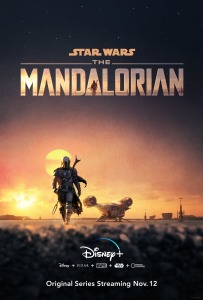 The Mandalorian (currently streaming on Disney+) is about the best Star Wars spin-off to come from LucasFilm in the past 20-some years (if ever), in great part because it doesn’t seem very Star Wars-y. Or at least what “Star Wars-y” has come to mean since the original trilogy debuted: needlessly complicated back story; self-serious and ponderous mythologizing; overlong playing time; character development that seems driven as much by merchandisability as narrative need. The Mandalorian by comparison is a breezy pleasure, a throwback to single-protagonist vintage TV Westerns like The Virginian or The Rifleman (without any intentional swagger/machismo or inadvertent misogyny/racism), wherein our reluctant protagonist becomes the lens through which a different 37-minute parable is told each week. Oh, and there’s a really adorable Baby Yoda, who may be the cutest, funniest creature dreamed up since the Ewoks (yes, I still like Ewoks). Producer/writer Jon Favreau joyfully wears his retro influences on his sleeve (as evidenced by the minimalistic percussive soundtrack and the closing credits sequence, both of which seem channeled straight from 1968). Leading man Pedro Pascal (face forever obscured under his signature bounty hunter helmet – “this is the waaaay“) conveys so much heart, great comedic timing, and an intriguing amount of agnosticism, without benefit of one. single. facial. expression. Four episodes in, and I can’t wait to see where this one is going.
The Mandalorian (currently streaming on Disney+) is about the best Star Wars spin-off to come from LucasFilm in the past 20-some years (if ever), in great part because it doesn’t seem very Star Wars-y. Or at least what “Star Wars-y” has come to mean since the original trilogy debuted: needlessly complicated back story; self-serious and ponderous mythologizing; overlong playing time; character development that seems driven as much by merchandisability as narrative need. The Mandalorian by comparison is a breezy pleasure, a throwback to single-protagonist vintage TV Westerns like The Virginian or The Rifleman (without any intentional swagger/machismo or inadvertent misogyny/racism), wherein our reluctant protagonist becomes the lens through which a different 37-minute parable is told each week. Oh, and there’s a really adorable Baby Yoda, who may be the cutest, funniest creature dreamed up since the Ewoks (yes, I still like Ewoks). Producer/writer Jon Favreau joyfully wears his retro influences on his sleeve (as evidenced by the minimalistic percussive soundtrack and the closing credits sequence, both of which seem channeled straight from 1968). Leading man Pedro Pascal (face forever obscured under his signature bounty hunter helmet – “this is the waaaay“) conveys so much heart, great comedic timing, and an intriguing amount of agnosticism, without benefit of one. single. facial. expression. Four episodes in, and I can’t wait to see where this one is going.
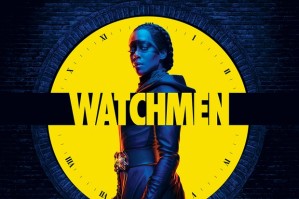 Watchmen (HBO) is so damn good. We had one of those “watch HBO for free!” weekends on Xfinity and, in a less than 24-hour period, we binged the first seven episodes, including tonight’s exemplary “An Almost Religious Awe” (every episode has a great title). I’m going to have to show up on the doorstep of some generous HBO-subscribing friend the next two Sundays to see how this thing wraps up! Any takers? The original DC comic book mini-series (1986-87) deconstructed the very notion of what a superhero was, offering a heady mix of cynicism and optimism, critical of Reagan-era excess and territorialism while satirically reinventing atomic age tropes of flying humans and hooded marvels, all to dissect the morals and ethics of those who set themselves up as our saviors. “Who watches the Watchmen?” Subsequent efforts to adapt the landmark series onscreen (no thank you, Zack Snyder) or revisit in print (just stop, Geoff Johns) have fallen flat, missing the existential trauma at the heart of the work. If you’d told my 14-year-old self that his 46-year-old future would include a triumphant, accessible yet layered, televised continuation of the storyline for a mainstream audience, I never would have believed you. In fact, it is this very question of identity and self and the ephemeral nature of time folding upon itself through memory that gives Watchmen its slippery power. The HBO series replaces the Cold War paranoia of the original comics with an incisive take on the race-baiting xenophobia currently paralyzing our country, in a way that is completely true to the original work while acknowledging how far we have (and haven’t) come as a society. Regina King and Jean Smart are (together) an acting powder keg, wrestling with thorny questions of race and gender, empowered and stonewalled and uninhibited and numb with white-hot rage. The supporting players are to a one excellent – Don Johnson (again!), Tim Blake Nelson, Jeremy Irons, Louis Gossett Jr., Hong Chau, Frances Fisher, Tom Mison, Sara Vickers – finding Shakespeare in the mundane and delivering a show that isn’t afraid to explore big ideas amongst daily tragedies. The score by Trent Reznor and Atticus Ross is a character unto itself – disco for a dark age, as if Phillip Glass found his groove. I have no idea where this show is going, and I can’t wait to get there … and I really don’t want it to end.
Watchmen (HBO) is so damn good. We had one of those “watch HBO for free!” weekends on Xfinity and, in a less than 24-hour period, we binged the first seven episodes, including tonight’s exemplary “An Almost Religious Awe” (every episode has a great title). I’m going to have to show up on the doorstep of some generous HBO-subscribing friend the next two Sundays to see how this thing wraps up! Any takers? The original DC comic book mini-series (1986-87) deconstructed the very notion of what a superhero was, offering a heady mix of cynicism and optimism, critical of Reagan-era excess and territorialism while satirically reinventing atomic age tropes of flying humans and hooded marvels, all to dissect the morals and ethics of those who set themselves up as our saviors. “Who watches the Watchmen?” Subsequent efforts to adapt the landmark series onscreen (no thank you, Zack Snyder) or revisit in print (just stop, Geoff Johns) have fallen flat, missing the existential trauma at the heart of the work. If you’d told my 14-year-old self that his 46-year-old future would include a triumphant, accessible yet layered, televised continuation of the storyline for a mainstream audience, I never would have believed you. In fact, it is this very question of identity and self and the ephemeral nature of time folding upon itself through memory that gives Watchmen its slippery power. The HBO series replaces the Cold War paranoia of the original comics with an incisive take on the race-baiting xenophobia currently paralyzing our country, in a way that is completely true to the original work while acknowledging how far we have (and haven’t) come as a society. Regina King and Jean Smart are (together) an acting powder keg, wrestling with thorny questions of race and gender, empowered and stonewalled and uninhibited and numb with white-hot rage. The supporting players are to a one excellent – Don Johnson (again!), Tim Blake Nelson, Jeremy Irons, Louis Gossett Jr., Hong Chau, Frances Fisher, Tom Mison, Sara Vickers – finding Shakespeare in the mundane and delivering a show that isn’t afraid to explore big ideas amongst daily tragedies. The score by Trent Reznor and Atticus Ross is a character unto itself – disco for a dark age, as if Phillip Glass found his groove. I have no idea where this show is going, and I can’t wait to get there … and I really don’t want it to end.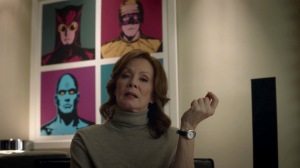
Postscript …
So as gluttony goes, I don’t think I’ll apologize for this indulgence of the mind as my brain is truly spinning with possibility, heading back into a work week, knowing that there are ideas bigger than ourselves as all ideas should be.
“The endless story of expectations wiring inside my mind/Wore me down/I came to a realization and I found a way to turn it around/To see/That I could just be me.”
– “I’m Not My Father’s Son,” Cyndi Lauper, Kinky Boots
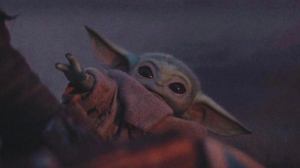
― Watchmen



